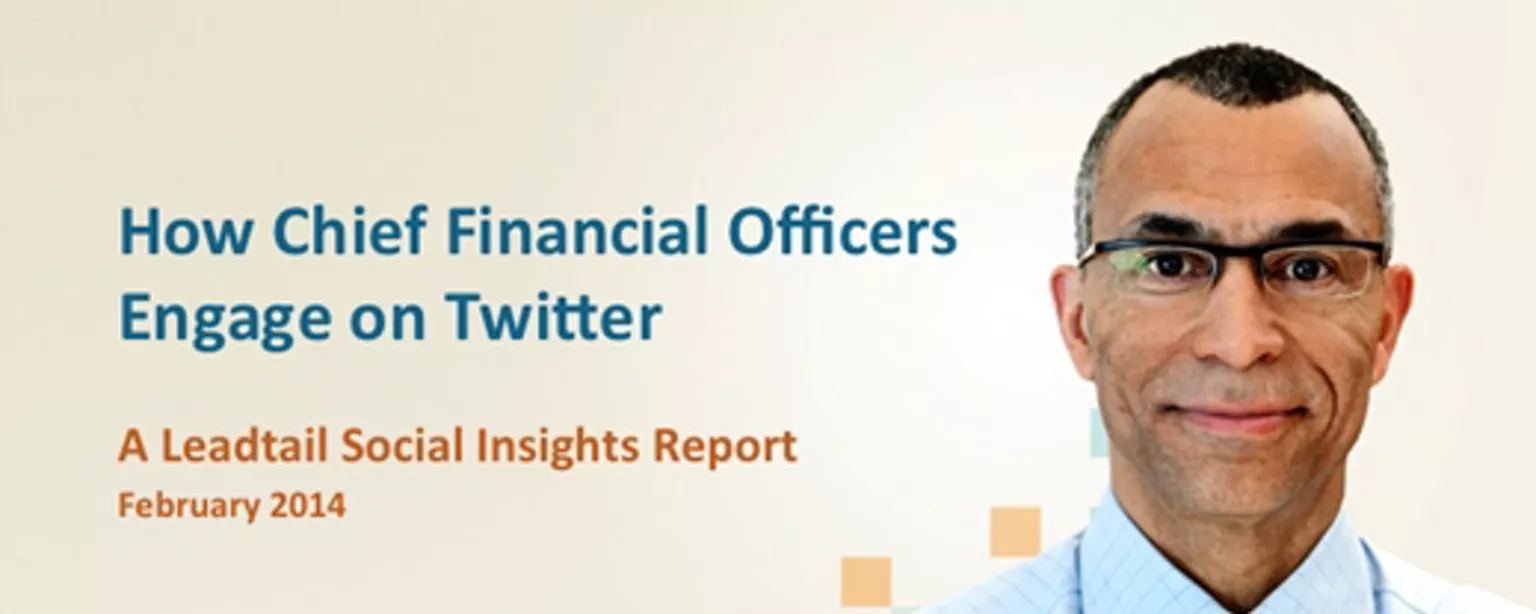These days everyone is on social media — everyone, that is, but CFOs and other finance types, right? Not true at all.
Finance professionals read blogs, have LinkedIn accounts, share photos on Facebook, and even tweet out from time to time.
The truth is social media is here to stay and it doesn’t matter whether you’re the CFO or a freshly minted junior accountant. And just because you don’t have a blog or spend your time on Snapchat, you’re still (increasingly) turning to social media to decide what to read, whom to connect with, and which vendors to consider.
For CFOs in particular, getting comfortable with social media also offers the opportunity to tap into a much broader peer network, communicate with and gauge the sentiment of investors, better relate to your staff, and get a more “hands-on” perspective of why social technologies are disrupting industries.
So how do senior finance executives engage on social media?
The social insights firm Leadtail released a report to shed some light on this very question by looking at the Twitter activity of 502 senior finance executives (CFOs and VPs of Finance) during the fourth quarter of 2013. Specifically, we analyzed 48,671 tweets and 3,395 shared links to better understand how CFOs describe themselves, what content they share, and who influences them on social media. Not surprisingly, many of the CFOs looked at came from major metros (New York and San Francisco Bay Area), which are typically ahead of the curve when it comes to technology adoption.
Why Twitter activity? Because social media data has a leg up on other data sources such as surveys, polls and focus groups since it shows what people really do … versus what they say they do.
With that said, here are four key insights that came from the report that you should consider when using (or getting started with) social media.
1. It’s okay to be who you are
Sure, senior finance professionals use terms like: CFO, VP, CPA, Finance, and Accounting in their Twitter bios. But they also include personal words like: Family, Father, and Enthusiast. Plus it’s not all work and no play when it comes to what CFOs engage with on social media. Besides business, leadership, innovation, and healthcare, they also like to read and share about sports, holidays, and local events.

So use social media to connect professionally and personally. Remember you’re engaging with people so it’s okay to be human, too.
2. Don’t limit yourself to only one social network
This may come as a surprise but CFOs aren’t just on LinkedIn. Many also share YouTube videos, and photos and status updates from Instagram and Facebook. Said another way, finance executives are like most people in that they use social media to share content from multiple social networks, especially during the holidays!
Whether it’s the major social networks like LinkedIn, Facebook, or Twitter or up and comers like Instagram, Vine, and SlideShare, discover which social networks make sense for you while experimenting with others, too.

3. Build credibility by sharing both mainstream and industry content
Content is the lifeblood of social media. It’s what we talk about and share. And for many business leaders, it comes from both mainstream and industry media sources. With the CFOs we looked at, their favorite content sources are The New York Times, Washington Post, Huffington Post, Forbes, The Wall Street Journal, and Business Insider. In particular, they showed the most interest in politics, current events, technology, leadership, and business.
What content sources are fueling your social media efforts? Consider broadening your approach to include some of these top media sources if you want to be seen as “in the know” about the issues and trends facing CFOs today.
4. Become influential with your target audience
One of the many benefits of social media is its ability to help you build an audience of friends, colleagues, and contacts who have the same interests as you. In the context of business, this can mean prospective customers (or employers) and others influential to the success of your business or personal brand. On Twitter, we gain insights into influence based on how often someone is retweeted or mentioned. For the CFOs we looked at, they liked to retweet and mention articles from the @WSJ, @Forbes, @Mashable, and @HarvardBiz.

Who do you want to connect and become influential with? This is an important question to answer as you build your own social audience. With that in mind, start sharing and engaging those publications, brands and people that influence your target audience. This will put you on the path to becoming influential with them, too!
The full social insights report on CFOs also includes the list of the top 25 business and technology content sources and the 50 publications, brands, and people most retweeted by CFOs.
This post was authored by Carter Hostelley, CEO of Leadtail.
Want more insights on how to succeed in your finance career, and build and manage a winning team? Subscribe to the Robert Half newsletter!







